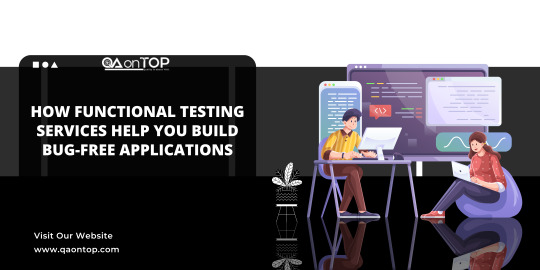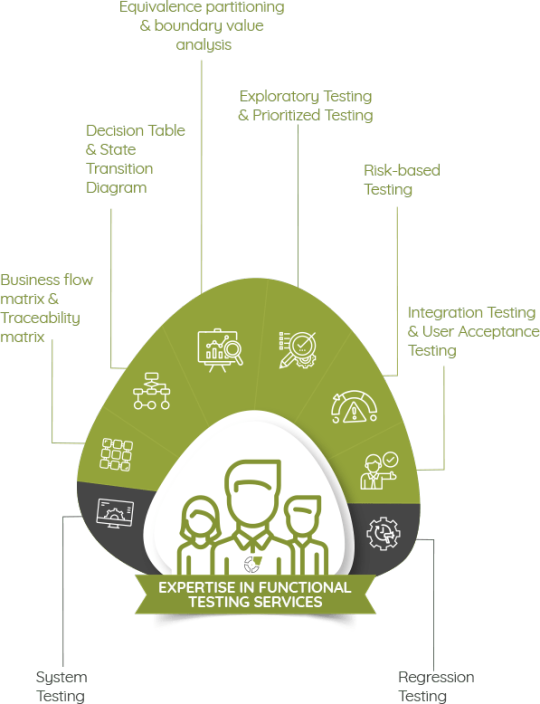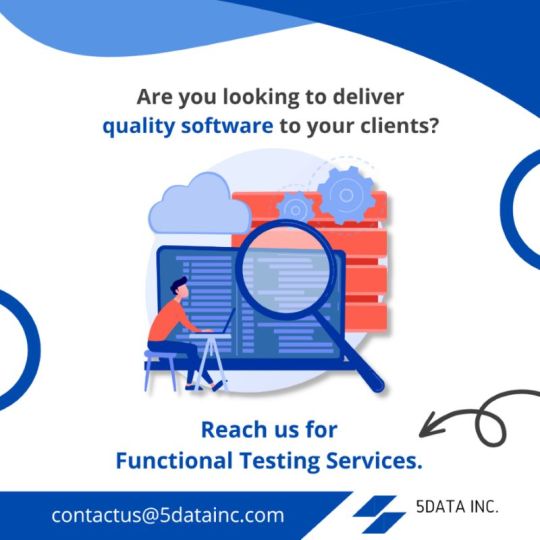#Functional testing Services
Explore tagged Tumblr posts
Text
Functional Testing Excellence by Robotico Digital: Bridging Code and User Expectations
Software success depends on flawless functionality—and ensuring that functionality requires expertise, precision, and commitment. Functional Testing Excellence by Robotico Digital: Bridging Code and User Expectations represents a holistic approach to quality assurance. Whether you're launching a new feature, integrating with third-party platforms, or scaling to millions of users, Robotico Digital ensures every function meets its promise. Choose Robotico Digital as your QA partner—and experience how rigorous functional testing can drive customer loyalty, business growth, and digital excellence.
0 notes
Text
How Functional Testing Services Help You Build Bug-Free Applications

In the fast-paced world of software development, ensuring that applications perform as expected is critical to user satisfaction and business success. Functional software testing services play a pivotal role in verifying that software systems function correctly according to specified requirements. These services not only help in identifying bugs but also ensure a seamless user experience.
In this blog, we will explore what functional testing is, its types, benefits, methodologies, and how partnering with professional functional software testing service providers can elevate your product quality.
What is Functional Software Testing?
Functional testing is a type of software testing that validates the software system against the functional requirements or specifications. The goal is to ensure that each function of the software application operates in conformance with the requirement specification. It primarily focuses on:
User interface
APIs
Databases
Security
Client/server communication
Other application functionality
In simple terms, functional testing answers the question: "Does the software do what it's supposed to do?"
Why Functional Software Testing Services Matter
With increasing complexities in software systems and rising user expectations, testing has evolved into a specialized function. Here’s why functional software testing services are crucial:
1. Quality Assurance
Functional testing ensures that the product is reliable and meets the expected performance criteria. It validates that the business logic and workflows perform as designed.
2. User Satisfaction
By focusing on usability and function, functional testing helps enhance the user experience. It ensures that end-users can interact with the software without glitches or confusion.
3. Cost-Effectiveness
Detecting and fixing bugs early in the software development lifecycle significantly reduces the cost of fixing issues post-release. This is where professional testing services add immense value.
4. Compliance and Standards
Industries like healthcare, finance, and aviation demand stringent compliance with regulatory standards. Functional testing ensures that software adheres to these standards, avoiding legal and operational risks.
Types of Functional Software Testing
Professional functional software testing services encompass a wide range of testing types, including:
1. Unit Testing
Testing individual components or modules of a software system. It is usually automated and helps identify issues at an early development stage.
2. Integration Testing
Ensures that combined modules or systems work together as expected. It focuses on data flow and interface communication.
3. System Testing
Validates the complete and fully integrated software product to ensure it complies with the requirements.
4. Smoke Testing
Also known as "build verification testing," it is a high-level test to check whether the major functionalities are working.
5. Sanity Testing
Performed to verify whether a particular function or bug fix works after changes in the code.
6. Regression Testing
Ensures that new code changes do not adversely affect the existing functionalities of the application.
7. User Acceptance Testing (UAT)
Validates the end-to-end business flow. UAT is usually performed by end-users to confirm the system meets their needs.
Functional Testing Tools
Several tools are used by functional software testing service providers to automate and enhance the testing process. Popular tools include:
Selenium – Ideal for web applications.
QTP (UFT) – Offers robust functional and regression testing.
TestComplete – Automates desktop, web, and mobile application testing.
JUnit/NUnit – Commonly used for unit testing in Java/.NET environments.
SoapUI – For testing REST and SOAP APIs.
These tools help improve accuracy, speed up testing cycles, and reduce human error.
Best Practices in Functional Testing Services
Professional functional software testing services follow best practices to deliver optimal results:
Clear Requirement Understanding: Testers must have a deep understanding of the business logic and functional requirements.
Early Test Planning: Involving testing teams early in the development phase ensures better coverage and efficient test case design.
Comprehensive Test Scenarios: Cover positive and negative scenarios, edge cases, and integration points.
Use of Automation: Automate repetitive tasks and regression suites to save time and improve efficiency.
Continuous Testing and Feedback: In agile environments, continuous testing helps in early defect detection and faster delivery.
Choosing the Right Functional Testing Service Provider
Outsourcing functional testing can be a strategic move for many organizations. Here are factors to consider when selecting a service provider:
Experience and Expertise: Look for providers with proven experience in your industry.
Tool Proficiency: Ensure they have expertise in modern testing tools and automation frameworks.
Communication and Collaboration: Agile and DevOps require close collaboration between developers and testers.
Cost-Effectiveness: Evaluate ROI and not just upfront costs.
Data Security: Confirm the vendor follows strict data protection protocols.
Benefits of Outsourcing Functional Software Testing Services
Many companies now rely on third-party QA partners to handle their functional testing needs. Here’s why:
1. Scalability
Testing partners can scale up resources quickly to match project requirements, making them ideal for growing businesses.
2. Focus on Core Development
Outsourcing allows your internal teams to focus on core development while experts handle the quality assurance process.
3. Access to Latest Tools and Techniques
Testing service providers invest in the latest tools, training, and methodologies—giving your project a technological edge.
4. Risk Mitigation
Professionals with domain expertise help identify potential issues before they impact your users.
Real-World Applications of Functional Testing
E-commerce Platforms: Ensuring checkout processes, search functionality, and user registration work without issues.
Banking Software: Validating account management, fund transfers, and security measures.
Healthcare Systems: Testing patient records, appointment systems, and compliance with health data regulations.
Mobile Apps: Ensuring compatibility across devices and platforms, smooth user flows, and performance efficiency.
Conclusion
Functional software testing services are indispensable in today’s digital world. They ensure that your application behaves as intended, meets user expectations, and delivers a seamless experience. Whether you’re a startup or an enterprise, investing in professional functional testing services ensures your software is reliable, secure, and market-ready.Don’t let bugs define your brand. Partner with a QaOnTop software testing service provider and release your software with confidence.
0 notes
Text

Reliable Functional Testing Services for Quality Assurance|5dataInc
In the USA, 5 DATA INC guarantees impeccable functionality and performance through our specialized functional testing services. Visit https://5datainc.com/
1 note
·
View note
Text
The Importance of Functional Testing Services in Modern Software Development

In today’s fast-paced software development landscape, ensuring the quality and functionality of applications has never been more critical. With businesses increasingly relying on digital platforms to reach customers and streamline operations, the need for robust and error-free software is paramount. This is where functional testing services come into play, acting as a key element in validating that applications work as intended.
What is Functional Testing?
Functional testing is a type of software testing that verifies whether a system operates according to specified requirements. It focuses on checking the functionality of the software, ensuring that all features and functionalities perform correctly without any errors. Unlike non-functional testing, which examines aspects like performance and security, functional testing solely tests the user-facing features and their compliance with predefined standards.
Key Elements of Functional Testing
Requirement Validation: Functional testing ensures that every aspect of the software is aligned with the business requirements. It helps validate that all functionalities meet the expectations set by the end users or stakeholders.
End-to-End Testing: From login functionalities to checkout processes, functional testing covers every critical workflow in the application. It ensures that users experience a smooth and intuitive interaction.
Automated and Manual Testing: Functional testing services can be performed both manually and through automated tools. Manual testing is ideal for complex user scenarios, while automation can be used for repetitive tasks to save time and resources.
Cross-Platform Compatibility: Functional testing services ensure that applications perform uniformly across different platforms, operating systems, and browsers, delivering a consistent user experience.
Benefits of Using Functional Testing Services
Improved Software Quality: Functional testing helps ensure that the software functions as expected, improving the overall quality of the product. By identifying defects early in the development cycle, businesses can reduce the risk of costly post-launch issues.
Customer Satisfaction: Well-tested applications lead to higher user satisfaction. When features work smoothly, users are more likely to engage with the application and recommend it to others.
Reduced Risk: Functional testing services mitigate the risk of system failures. By catching bugs before they reach production, businesses can avoid potential downtime, security vulnerabilities, or loss of data integrity.
Cost Efficiency: Early detection of functional defects helps reduce the cost of fixing issues. Addressing bugs post-launch can be far more expensive, impacting not only financial resources but also time-to-market.
Compliance and Security: Functional testing also ensures that software meets industry regulations and compliance requirements. It validates that data handling, access permissions, and security features are working correctly, helping businesses avoid legal pitfalls.
Trends in Functional Testing Services
The functional testing landscape is constantly evolving, with new trends shaping how services are delivered. Here are some of the top trends:
Test Automation: As organizations push for faster development cycles, automation is becoming integral to functional testing. Automated functional testing services help in quickly validating new releases, ensuring continuous delivery without compromising on quality.
AI and Machine Learning in Testing: Artificial Intelligence (AI) and Machine Learning (ML) are now being integrated into functional testing tools, allowing for more intelligent test case generation, defect prediction, and even automated test maintenance.
Cloud-Based Functional Testing: With cloud adoption on the rise, many businesses are leveraging cloud-based functional testing services. These services allow for scalable, flexible testing environments that can handle multiple test cases simultaneously, improving efficiency.
Shift-Left Testing: This practice involves performing functional testing earlier in the development cycle, reducing the time needed to identify and fix issues. It aligns with DevOps and Agile methodologies, promoting continuous testing and integration.
Focus on User Experience (UX): In modern functional testing, there is a growing emphasis on how users interact with software. Testing services are evolving to not only check functionality but also ensure that features enhance the user experience.
Choosing the Right Functional Testing Services
When selecting functional testing services, businesses must consider several factors:
Experience and Expertise: The testing service provider should have a proven track record in functional testing, with expertise in working with both manual and automated testing tools.
Tool Proficiency: The provider should be proficient in leading functional testing tools such as Selenium, QTP, or TestComplete, offering both open-source and commercial tool expertise.
Custom Solutions: Each business is unique, and so are its testing needs. Functional testing services should be tailored to meet specific industry requirements, whether it’s for web applications, mobile platforms, or complex enterprise software.
Cost-Effectiveness: The right functional testing services should strike a balance between quality and cost. Affordable yet comprehensive testing ensures that businesses can maintain software quality without breaking the bank.
Conclusion
Functional testing services play a pivotal role in ensuring the success of software applications. By validating that every feature performs as expected, these services help businesses deliver high-quality, reliable, and secure software. With the rise of automation, AI integration, and cloud-based testing, functional testing is evolving to meet the demands of modern development cycles, ensuring that businesses can stay ahead of the curve while providing excellent user experiences.
By investing in functional testing services, businesses can not only reduce the risk of costly post-release issues but also build trust with their customers, leading to long-term success in the competitive digital marketplace.
0 notes
Text

Embark on a global bug hunt with our SDET team, leveraging cloud-based mobile testing to ensure your app achieves flawless performance across all devices and networks. With cutting-edge tools and a meticulous approach, we identify and eliminate bugs before they impact your users. https://rb.gy/jfueow #SDET #BugHunt #CloudTesting #MobileAppQuality #FlawlessPerformance SDET Tech Pvt. Ltd.
#Software Testing Companies in India#Software Testing Services in India#Test Automation Development Services#Test Automation Services#Performance testing services#Load testing services#Performance and Load Testing Services#Software Performance Testing Services#Functional Testing Services#Globalization Testing services#Globalization Testing Company#Accessibility testing services
Agile Testing Services#Mobile Testing Services#Mobile Apps Testing Services#ecommerce performance testing#ecommerce load testing#load and performance testing services#performance testing solutions#product performance testing#application performance testing services#software testing startups#benefits of load testing#agile performance testing methodology#agile testing solutions#mobile testing challenges#cloud based mobile testing#automated mobile testing#performance engineering & testing services#performance testing company#performance testing company in usa
0 notes
Text

Comprehensive Quality Assurance Services for Optimal Software Performance Explore our infographic to discover how our comprehensive Quality Assurance services ensure optimal software performance. Learn about our systematic approach to testing and quality control, designed to identify and resolve defects, enhance functionality, and deliver a seamless user experience. Our services include functional testing, performance testing, security testing, and more to guarantee your software meets the highest standards of quality and reliability. Visit our website to find out more about how we can help your business achieve its software quality goals.
#quality assurance services#quality assurance#functional testing#functional testing services#best functional testing services#automation testing#automation testing services#best automation testing services
1 note
·
View note
Text
Stop Bugs in Their Tracks: Functional Testing Services Are Your Secret Weapon

In the rapidly advancing field of technology, bugs in software can provide a significant obstacle to achievement. The effects of defective software are severe and might range from unpleasant user experiences to monetary losses. Functional testing services act as a secret weapon that can be used to tackle these flaws. Let's explore the benefits of functional testing services, different testing approaches, choosing the best vendor, and the continuous significance of testing that is free of errors.
For more information, read https://gunaworks.medium.com/stop-bugs-in-their-tracks-functional-testing-services-are-your-secret-weapon-8ef07774a084
#functional testing#functional testing services#white box testing#black box testing#software#software development#software design#software testing#agiledevelopment#agileprojectmanagement#development
0 notes
Text

Expert Functional Testing Services in the USA | Types of Testing
Elevate your software reliability with our top-tier functional testing services. Trust in our expertise for error-free results. Visit: https://5datainc.com/
#Performance Testing Company
#Functional Testing Services
0 notes
Text
Functional Testing Excellence by Robotico Digital: Bridging Code and User Expectations

In the digital age, software functionality isn't just about whether an application runs—it's about how efficiently it aligns with business objectives and fulfills user needs. The line between product success and failure often lies in how seamlessly the software works across varied scenarios. Functional Testing Excellence by Robotico Digital: Bridging Code and User Expectations highlights how a quality-first mindset can lead to superior digital experiences.
Understanding the Importance of Functional Testing in Software Development
Software development has evolved from simply creating applications to ensuring they serve real-world purposes. As businesses scale and digitize, software must behave consistently, reliably, and accurately. Functional testing verifies that each software component performs its intended function without errors or bugs.
Functional testing services evaluate critical aspects such as login flows, data integrity, search functions, payment processing, and other key functionalities. This process ensures applications not only run but deliver a seamless user experience aligned with business logic.
With Robotico Digital, functional testing becomes more than a quality checkpoint—it transforms into a strategic enabler that enhances user trust and satisfaction.
AI and Future-Ready Functional Testing
As the software landscape becomes increasingly dynamic, the demand for intelligent testing solutions continues to rise. In response to these evolving needs, Robotico Digital is redefining the standards of quality assurance by embedding artificial intelligence (AI) and machine learning (ML) into its functional testing services. This forward-thinking approach empowers businesses to maintain speed, accuracy, and efficiency while adapting to modern development practices like Agile, DevOps, and rapid release cycles.
By leveraging AI-powered solutions, Robotico Digital is not just testing for the present—it’s preparing for the future. Their AI-integrated testing framework transforms conventional QA into a smart, scalable solution that evolves in sync with product updates and user behaviors.
Predictive Testing: Focusing on What Matters Most
One of the standout innovations in Robotico Digital’s AI arsenal is predictive testing. By analyzing historical test data, defect trends, and system usage patterns, predictive testing models can intelligently identify high-risk areas in the application. Instead of spending valuable resources on exhaustive testing of low-impact functionalities, QA teams can now focus their efforts where failures are most likely to occur.
This targeted method significantly improves test efficiency and allows organizations to allocate resources strategically, making their functional testing services faster and more impactful. Moreover, predictive models evolve continuously, learning from every test cycle to provide sharper insights over time.
Smart Object Recognition: Adapting to Change in Real-Time
Traditional automation often breaks when a UI component changes—like a button shifting position or a form field being renamed. This results in costly script maintenance and testing delays. Robotico Digital’s software functional testing strategy includes smart object recognition, a cutting-edge AI feature that enables test scripts to dynamically identify and adapt to such UI changes.
Using machine learning algorithms, the system learns the underlying patterns of UI elements and maintains test integrity even when superficial modifications occur. This not only boosts the stability of automated tests but also accelerates regression cycles, ensuring that frequent UI changes do not slow down development pipelines.
For companies engaged in frequent feature updates or working with user-interface-rich applications, smart object recognition is a game-changer within functional testing services.
Self-Healing Scripts: Minimizing Manual Maintenance
Script maintenance is often cited as one of the biggest challenges in test automation. Each change in the application can require multiple updates across test suites, consuming time and effort. To address this, Robotico Digital integrates self-healing scripts into its functional testing services.
These scripts automatically detect broken test cases caused by changes in the code or UI and apply intelligent fixes based on historical data and AI models. The result is significantly reduced manual intervention, lower maintenance costs, and greater reliability in test automation.
Self-healing capabilities are particularly valuable in continuous testing environments where rapid releases are common. This allows teams to maintain momentum without compromising on the quality of their software functional testing efforts.
Competitive Advantage Through AI-Driven Testing
By integrating AI into its QA ecosystem, Robotico Digital offers functional testing services that go beyond traditional validation. Clients benefit from faster defect detection, more stable automation, and lower overhead—all while keeping pace with agile delivery models.
Moreover, AI-driven insights provide development and QA teams with actionable intelligence that enhances both testing strategies and product design. The integration of AI is not just about efficiency—it’s about enabling smarter decision-making throughout the software lifecycle.
The Core of Functional Testing Services
Functional testing focuses on validating software against predefined business requirements and functional specifications. These include:
l User authentication and role-based access
l Data input and processing accuracy
l Transaction workflows
l Compliance with business rules
Unlike non-functional testing—which covers performance, load, and security—software functional testing ensures the software "does what it’s supposed to do."
Robotico Digital approaches this core process methodically. Their QA team ensures each user action and backend logic works harmoniously, reducing the risk of end-user disruptions. Through early detection of functionality gaps and behavior mismatches, Robotico prevents defects from escalating into costly production issues.
Robotico Digital’s Strategic Framework for Functional Testing
At the heart of Functional Testing Excellence by Robotico Digital: Bridging Code and User Expectations lies a meticulously designed testing framework that transforms quality assurance into a strategic business advantage. This structured approach ensures reliability, speed, and user satisfaction across every software release. The framework is built on four foundational pillars:
1. Requirements Traceability Matrix (RTM)
Robotico Digital emphasizes traceability by meticulously aligning each test case with defined business and functional requirements. This guarantees 100% coverage, eliminates gaps in testing, and provides a clear audit trail throughout the software development lifecycle. The RTM also supports regulatory compliance and boosts stakeholder confidence by demonstrating that every requirement is thoroughly validated.
2. Reusability through Modular Testing
Efficiency is a cornerstone of Robotico Digital’s approach. Modular test design allows reusable scripts and component-based test libraries to be applied across multiple features and even different applications. This minimizes redundancy, accelerates test creation, and ensures consistency, especially in large-scale or evolving product environments.
3. Prioritized Testing
With a risk-based methodology, Robotico Digital ensures that critical application areas receive the highest testing priority. By focusing on high-impact, mission-critical functionalities first, the team proactively addresses potential failure points that could disrupt core user journeys. This not only improves defect detection but also optimizes resource allocation and time-to-market.
4. Hybrid Execution Model
To balance speed and depth, Robotico Digital combines the strengths of automated and manual testing within a hybrid execution model. Automated tests rapidly handle repetitive or regression scenarios, while manual testing is applied to areas requiring exploratory, usability, or one-off assessments. This flexible model adapts seamlessly to the needs of diverse applications and release cycles.
The Power of Automation in Functional Testing
In an agile world where continuous delivery is the norm, manual testing alone isn't enough. Robotico Digital harnesses the power of automation to increase speed, reduce human error, and expand test coverage.
Automation Tools & Practices
Robotico Digital employs best-in-class tools like:
l Selenium
l TestNG
l JUnit
l Cypress
These are used to automate test scenarios for login, data validation, workflows, and third-party integrations.
Supporting Strategies
l CI/CD Pipeline Integration: Automated tests run with every code push, reducing regression issues.
l Parameterized Testing: Different data sets are tested without rewriting scripts, saving effort.
l Comprehensive Reporting: Real-time dashboards help track progress and identify issues early.
With automation embedded deeply into their processes, Robotico ensures consistent, reliable, and scalable testing across all platforms.
Delivering a User-Centric QA Experience
Functional testing isn’t just a technical necessity—it’s about validating user experience (UX) and ensuring customer delight.
Human-Centered Testing
Testers simulate real user behaviors to uncover usability issues that automated tools might miss.
Cross-Platform Validation
Ensures the application functions correctly across:
l Desktops
l Smartphones
l Tablets
l Multiple browsers and OS versions
UX and Accessibility Testing
Robotico verifies that applications are intuitive and inclusive—compliant with WCAG and accessible to users with disabilities.
By blending QA with user empathy, Robotico enables software that not only works but resonates with its audience.
Why Robotico Digital Stands Out
Several factors distinguish Robotico Digital from generic QA vendors:
l Tailored test strategies based on business needs
l Balanced test coverage with automation and human intuition
l Transparent communication through real-time reporting
l Vertical-specific expertise across healthcare, fintech, retail, and education
Most importantly, Robotico helps businesses build and retain user trust by ensuring flawless application behavior.
Conclusion: Building Better Software with Functional Precision
Software success depends on flawless functionality—and ensuring that functionality requires expertise, precision, and commitment. Functional Testing Services by Robotico Digital: Bridging Code and User Expectations represents a holistic approach to quality assurance. Whether you're launching a new feature, integrating with third-party platforms, or scaling to millions of users, Robotico Digital ensures every function meets its promise.
Choose Robotico Digital as your QA partner—and experience how rigorous functional testing can drive customer loyalty, business growth, and digital excellence.
0 notes
Text
Sigma Solve provides comprehensive testing services by adopting structured approach to ensure flawless functionality of your software solutions. Our dedicated team of experienced QA engineers meticulously tests your applications against functional requirements, identifying defects and ensuring that all features and functionalities work as intended.
0 notes
Text

Functional Testing Services for Web & Mobile Applications
Experience excellence with our Functional Testing Services in the USA. Visit our website & explore all other services @ https://5datainc.com/functional-testing/
1 note
·
View note
Text
Functional Testing services help to identify of defected elements, ensure that the software meets the desired requirements, enhance the user experience, etc. Read More @ https://bit.ly/3YuPXWL
0 notes
Text
System Integration
Railway Signaling Systems
Power inverters
Controllers for industrial equipment
Medical devices and equipment
Fuel dispensing systems
Telematics modules
Camera and Vision Systems
Sensing and detection systems
#Complete Box Build#Life Cycle Management#Configuration Management#Cabinets#Enclosures#& Rack-Mount Systems#Functional Testing#Electromechanical Assemblies#electronics manufacturing services#electronic manufacturing services#electronic manufacturing services companies#electronics manufacturing services India#electronics manufacturing services chennai#top Ems companies in India#bestEmscompanies in India#EMS#System Integration
2 notes
·
View notes
Text

By ensuring your software is meticulously tested for global readiness, we help you deliver seamless user experiences across diverse languages and cultures. Let's transform your product into a global phenomenon, reaching audiences far and wide with precision and reliability. https://bit.ly/3EKzvs2 #SDET #GlobalProduct #LanguageGap #SoftwareTesting #UserExperience #Localization SDET Tech
#Software Testing Companies in India#Software Testing Services in India#Test Automation Development Services#Test Automation Services#Performance testing services#Load testing services#Performance and Load Testing Services#Software Performance Testing Services#Functional Testing Services#Globalization Testing services#Globalization Testing Company#Accessibility testing services
Agile Testing Services#Mobile Testing Services#Mobile Apps Testing Services#ecommerce performance testing#ecommerce load testing#load and performance testing services#performance testing solutions#product performance testing#application performance testing services#software testing startups#benefits of load testing#agile performance testing methodology#agile testing solutions#mobile testing challenges#cloud based mobile testing#automated mobile testing#performance engineering & testing services#performance testing company#performance testing company in usa
0 notes
Text
Cloud Platforms Testing at GQAT Tech: Powering Scalable, Reliable Apps
In today's digital world, most companies use the cloud to host their software, store their data, and provide users with seamless experiences and interactions, meaning their cloud-based systems have to be fast and secure (it could be an e-commerce site, a mobile app, or corporate software platform) and be able to provide a robust reliable level of service that does not fail. All this hard work to develop a cloud-based application means nothing if the application is not subjected to testing and verification to work properly in different cloud environments.
Credit should be given to GQAT Tech for making cloud platform testing a core competency, as the entire QA team tests applications in the cloud, on cloud-based platforms, i.e., AWS, Azure, Google Cloud, or Private Cloud, while testing for performance, security, scalability, and functionality.
Now, let's explore the definition of cloud platform testing, what it is, why it is important, and how GQAT Tech can help your company be successful in the cloud.
What Is Cloud Platform Testing?
Cloud platform testing provides validation of whether a web or mobile application will function correctly in a cloud-based environment (as compared to on a physical server).
It involves testing how well your app runs on services like:
Amazon Web Services (AWS)
Microsoft Azure
Google Cloud Platform (GCP)
IBM Cloud
Private/Hybrid cloud setups
The goal is to ensure your app is:
Scalability - Will it support more users over time with no performance degradation?
Improve security - Is my data protected from being compromised/attacked?
Stability - Is it repeatably functioning (no crashing or errors)?
Speed - Is the load time fast enough for users worldwide?
Cost - Is it utilizing cloud resources efficiently?
GQAT Tech’s Cloud Testing Services
GQAT Tech employs a hybrid process of manual testing, automated scripts, and real cloud environments to validate/applications in the most representative manner. The QA team manages real-time performance, availability, and security across systems.
Services Offered:
Functional Testing on Cloud
Validates that your app will behave in an appropriate way while hosted on different cloud providers.
Performance & Load Testing
Validates how your app behaves when 10, 100, or 10,000 users are accessing it at the same time.
Scalability Testing
Validates whether your app is capable of scaling up or down based on usage.
Security Testing
Validates for vulnerabilities specific to clouds: data leak vulnerabilities, misconfigured access, and DDoS risks.
Disaster Recovery & Backup Validation
Validates whether systems can be restored after failure or downtime.
Cross-Platform Testing
Validates your application's performance across AWS, Azure, GCP, and Private Cloud Systems.
Why Cloud Testing Is Important
By not testing your application in the cloud, you expose yourself to significant risks such as:
App crashes when usage is highest
Data loss because of inadequate backup
Cloud bills that are expensive due to inefficient usage
Security breaches due to weaker settings
Downtime that impacts customer frustration
All of these situations can be prevented and you can ensure your app runs smoothly every day with cloud testing.
Tools Used by GQAT Tech
GQAT Tech uses advanced tools for cloud testing:
Apache JMeter – Load testing and stress testing
Postman – API testing for cloud services
Selenium / Appium – Automated UI testing
K6 & Gatling – Performance testing
AWS/Azure/GCP Test Environments – Real cloud validation
CI/CD Pipelines (Jenkins, GitHub Actions) – Continuous cloud-based testing
Who Needs Cloud Platform Testing?
GQAT Tech works with startups, enterprises, and SaaS providers across industries like:
E-commerce
Healthcare
Banking & FinTech
Logistics & Travel
IoT & Smart Devices
Education & LMS platforms
If your product runs in the cloud, you need to test it in the cloud—and that’s exactly what GQAT does.
Conclusion
Cloud computing provides flexibility, speed, and power—but only if your applications are tested and validated appropriately. With GQAT Tech's cloud platform testing services, you can be confident that your application will work as required under all real-world environments.
They will help eliminate downtime, enhance app performance, protect user data and help optimize cloud expenditure—so you can expand your business without concern.
💬 Ready to test smarter in the cloud? 👉 Explore Cloud Platform Testing Services at GQAT Tech
#Cloud Platform Testing#AWS Testing#Azure Testing#Google Cloud QA#Cloud Application Testing#Performance Testing on Cloud#Cloud Scalability Testing#Functional Testing on Cloud#Cloud Security Testing#Cloud-Based QA#GQAT Cloud Services#CI/CD in Cloud#Real-Time Cloud Testing#Cloud QA Automation#SaaS Testing Platforms
0 notes
Text
Benefits of Non-Functional Testing

Non-functional testing brings numerous benefits that enhance our software's overall quality. It helps us identify performance bottlenecks early, ensuring efficient system operation. By ensuring compliance with standards, we protect our users and brand reputation. We boost user satisfaction through usability and accessibility testing, while also improving system security and reliability. Together, these efforts lead to software that not only meets but exceeds expectations. Let's explore more about how non-functional testing can elevate our projects even further.
Enhancing Overall Product Quality

When we focus on enhancing overall product quality through non-functional testing, we guarantee that our software not only meets functional requirements but also excels in performance, usability, and security.
By addressing non-functional aspects, we increase usability, efficiency, and maintainability, ultimately reducing production risks and associated costs. Non-functional testing allows us to optimize installation, execution, and monitoring processes, giving us deeper insights into product behavior and technology.
This proactive approach ensures compliance with industry standards while providing valuable metrics for continuous improvement. Our users experience a more reliable and satisfying interaction with our product, leading to greater trust and loyalty.
Essentially, non-functional testing is key to delivering a high-quality software product that meets and exceeds user expectations.
Identifying Performance Bottlenecks

While enhancing overall product quality through non-functional testing, we also need to focus on identifying performance bottlenecks that can hinder our software’s effectiveness. Recognizing these bottlenecks early allows us to optimize our applications, ensuring they perform seamlessly under pressure.
Ensuring Compliance With Standards

Ensuring compliance with standards is essential for delivering high-quality software that meets both user expectations and regulatory requirements.
By focusing on non-functional testing, we can verify that our applications adhere to critical standards, such as security, performance, and reliability. This process not only safeguards our users but also protects our brand's reputation.
When we identify and address compliance issues early, we minimize risks and avoid costly delays later in development. Additionally, non-functional testing enhances our understanding of how the software behaves under various conditions, ensuring that we meet industry benchmarks.
Ultimately, this commitment to compliance lays a strong foundation for our software's success and fosters trust among our users and stakeholders.
Increasing User Satisfaction

Boosting user satisfaction is a key goal of non-functional testing, as it directly impacts how customers perceive and interact with software. When we conduct thorough usability testing, we guarantee that software isn't only functional but also user-friendly. This means users can complete tasks efficiently, which increases their overall satisfaction.
By implementing accessibility testing, we also make sure that our applications are usable for everyone, including individuals with disabilities. Additionally, identifying potential software failures early allows us to address issues before they reach the market, preserving our brand reputation.
Ultimately, reliable software that meets customer expectations leads to increased sales and a stronger market share, reinforcing our commitment to delivering exceptional user experiences.
Improving System Security and Reliability

To enhance system security and reliability, we must focus on identifying vulnerabilities and strengthening our defenses against potential threats.
Non-functional testing plays an essential role in this process by evaluating our software's performance under various conditions and loads. By proactively identifying security vulnerabilities, we can mitigate risks before they affect end users.
This testing also assesses our system's reliability, ensuring it performs consistently without failure, even during peak usage. Furthermore, adherence to industry regulations and standards through rigorous testing boosts user confidence in our product.
Ultimately, investing in non-functional testing not only safeguards our systems but also enhances overall user experience and trust, paving the way for long-term success.
Frequently Asked Questions
How Does Non-Functional Testing Impact System Scalability?
Non-functional testing directly impacts system scalability by ensuring our applications can handle increased loads efficiently. By identifying potential bottlenecks early, we optimize performance, allowing our systems to grow without compromising user experience or reliability.
How Often Should Non-Functional Testing Be Conducted?
We should conduct non-functional testing regularly, ideally during each software iteration. This way, we can catch potential issues early, ensuring our product meets performance and usability standards while maintaining high quality throughout development.
Can Non-Functional Testing Reduce Overall Project Costs?
Absolutely, we can reduce overall project costs through non-functional testing. By identifying issues early, we minimize expensive fixes later, streamline our processes, and enhance overall efficiency, ultimately saving time and resources throughout the project lifecycle.
What Are the Challenges in Automating Non-Functional Testing?
Automating non-functional testing presents challenges like resource intensity, the need for specialized tools, and difficulties in quantifying results. We've also faced issues with environmental variables affecting test consistency and the potential for diminishing returns.
Conclusion
In summary, embracing non-functional testing is vital for delivering high-quality software that stands out in today's competitive market. By focusing on performance, security, and user experience, we can proactively tackle potential issues, ensuring our products are reliable and robust. As we prioritize these essential aspects, we not only enhance user satisfaction but also strengthen our brand's reputation. Let's make non-functional testing an integral part of our development process, paving the way for success in our software endeavors.
0 notes